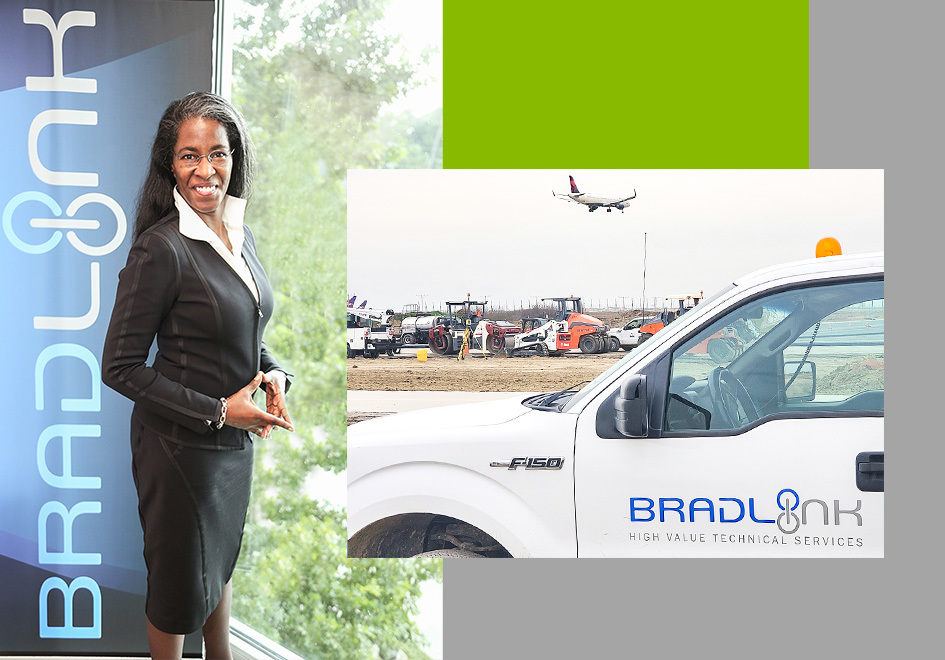Adapt. Adapt again. And then do it again.
It’s a common practice for small-business owners – now, more than ever. Just ask Helen Callier.
“Keep moving, and face things head on,” she advised, before sharing a distinctly Texas insight. “The bull goes into the wind while the cattle go to the back of the fence and huddle. The bull survives; the cattle struggle.”
Callier is president of Bradlink LLC, an award-winning technical services company tackling large-scale aviation, transit and municipal projects. Callier and her team of 14 employees were grateful to be busy in a pandemic year when many small businesses were not.
“We had a strong 2020,” said Callier. “We were working a construction project at the Dallas-Fort Worth International Airport. They were full steam ahead in their focus of taking advantage of the time period to build. It was full throttle.”
Also adapting is the Initiative for a Competitive Inner City, a nonprofit founded by Harvard Business School Professor Michael Porter to support entrepreneurs like Callier. Twice, she has attended the initiative’s Inner City Capital Connections program, called ICCC for short. ICCC offers tuition-free training for underserved small businesses, delivered by some of the best business minds in the country. Workshops tackle practically everything, from cash flow to talent management, marketing, capacity building and more.
It’s been particularly critical to continue to offer and even expand the scope of our ICCC program. Our experience shows that small businesses, particularly those that are minority- or woman-owned, are at greatest risk of survival.
Steve Grossman, CEO of ICIC
Regions Bank is a longtime ICCC sponsor, and the company’s bankers participate by sharing financial management strategies. Plans were confirmed to bring ICCC to Houston in 2020. But then COVID-19 closed everything.
Time to adapt.
“Small-business owners have needed access to resources, training and capital more than ever due to the economic effects of the pandemic,” said John Stacy, market executive for Regions Bank in Houston. “While we were disappointed we couldn’t host the ICCC Houston program in person as originally planned, we knew it was far more important to proceed with holding the program virtually to connect entrepreneurs with the tools they need.”
Just as lockdowns were starting, so, too, were virtual ICCC seminars. People who’d signed up for ICCC Houston were connected with videoconference coaching. Callier participated in ICCC’s Philadelphia virtual session. More are scheduled, including one specifically for Houston.
“It’s been particularly critical to continue to offer and even expand the scope of our ICCC program,” said Steve Grossman, CEO of ICIC. “Our experience shows that small businesses, particularly those that are minority- or woman-owned, are at greatest risk of survival. Presenting revised approaches to strategy and marketing, offering technical assistance and providing one-on-one coaching have been a lifeline for so many hard-working small-business owners to help them preserve essential jobs.”
Callier’s tenacity and thirst for knowledge have always served her well. She’s the daughter of two college professors who also owned a family auto paint and repair business. Callier has always enjoyed working on cars. She studied mechanical engineering at Prairie View A&M University.
“One hundred females would enter the program, and about 10 percent would graduate,” she said. “My head was always in a book.”

In addition to mechanical engineering, Callier’s background also includes working in the oil and gas industry, as well as plastics.
“It’s Texas, that’s what you did in oil country,” said Callier.
Today, what Callier does is run a second small business. Permit Us Now expedites building permits for large grocery and drug store chains, among other markets. But Callier notes the work of Permit Us Now represents something far bigger.
“We’re opening doors for businesses,” she said. “We’re working to improve the quality of life for communities. That’s why we do what we do.”
Callier also continues learning to elevate both of her companies thanks to resources like ICCC. She’ll be participating in the rescheduled Houston workshop in late March.
What’s her favorite part of ICCC?
“The people in the room,” Callier quickly answers. “The exchange of ideas in the room, the transfer of energy.”
ICIC has found a way to adapt that “in the room” experience to powerful coaching through technology.
“We’ve experienced record demand throughout the country from entrepreneurs who have seen us significantly modify our curriculum and dramatically expand coaching,” said Steve Grossman. “Our instructors adapted their presentations to discuss crisis management and business resilience that empower and encourage entrepreneurs to develop bold new strategies and thrive once again after the pandemic.”
Beyond the valuable business insights she gains from each ICCC session, Callier appreciates the lasting relationships she’s formed with fellow ICCC alumni like Janice Jucker, co-owner of Three Brothers Bakery in Houston.
“I can call the entrepreneurs I’ve met and they can call me,” she said. “We’re a resource for each other.”
Especially in challenging times that require adapting at every turn.
“We’re resilient,” she said. “We believe we create our own success.”